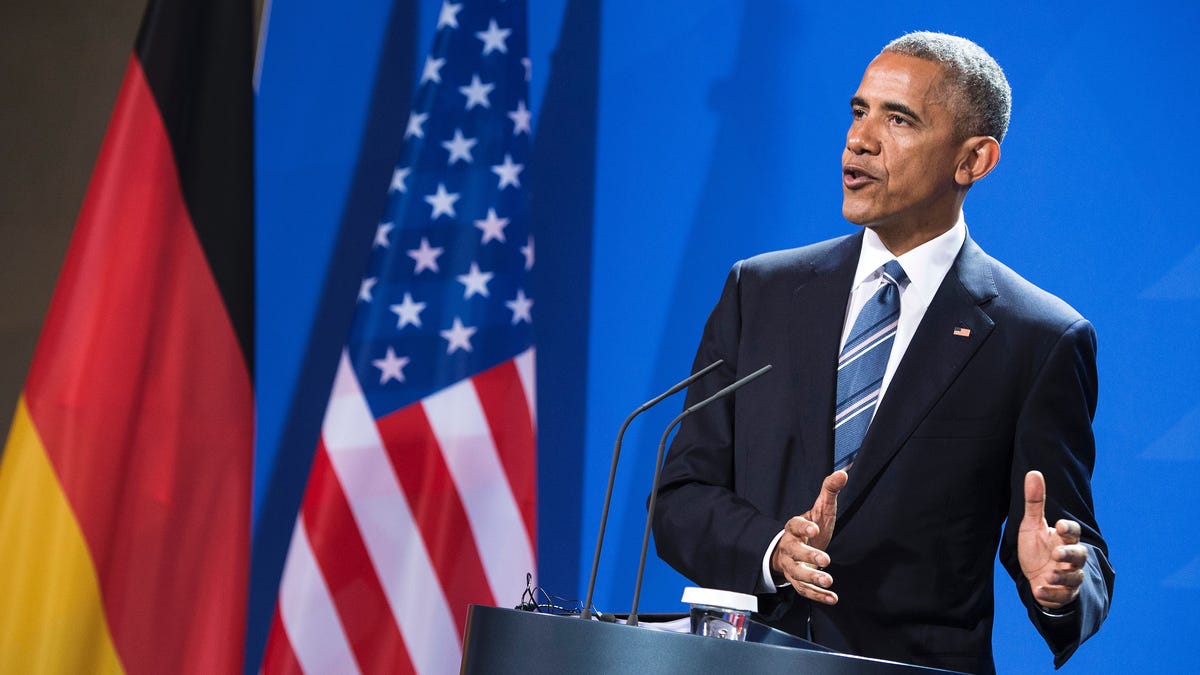President Obama slams fake news for eroding democracy
Obama warns that people must learn the difference between serious arguments and propaganda on social media.

"If we can't discriminate between serious arguments and propaganda, then we have problems," President Barack Obama said Thursday.
Fake news has the power to damage or even destroy democracy, President Barack Obama warned Thursday in a joint press conference in Germany with Chancellor Angela Merkel.
"If we are not serious about the facts and what's true and what's not, particularly in the social media era when so many get information from sound bites and snippets off their phone, if we can't discriminate between serious arguments and propaganda, then we have problems," he said.
His comments come as Facebook, Google and other websites are under fire for distributing deliberately misleading stories before the US presidential election.
"If people, whether they're conservative or liberal, left or right, are unwilling to compromise and engage in the democratic process and are taking absolutist views and demonizing opponents then democracy will break down," Obama said.
While Obama didn't mention Facebook by name, the social network lies at the heart of the bogus-news controversy for two reasons. Nearly 45 percent of the US population get their news from Facebook, according to the Pew Research Center and Knight Foundation. And Facebook users saw more fake news headlines than real ones in the three months before the election, according to a new Buzzfeed report.
The report compared news stories from hoax sites and ultra-partisan blogs to those from 19 major news outlets. Facebook users clicked on, liked or shared fake stories 8.7 million times. They reacted to legitimate stories fewer than 7.4 million times.
All but three of the top 20 fake election-related stories were anti-Clinton.
Also on Thursday, one of the biggest publishers of fake news, with more than 10 sites, took credit for Donald Trump becoming president.
"My sites were picked up by Trump supporters all the time," Paul Horner told The Washington Post. "I think Trump is in the White House because of me."
Facebook users landing on one of Horner's stories would have read the Amish were backing Trump, for example, and that Obama had banned the national anthem at all sporting events.
With its 1.79 billion users, Facebook faces tough questions about its responsibility in informing the public -- or more specifically in this case, the voting electorate. But it isn't the only internet giant caught up by fake news.
Earlier this week, Google said it had mistakenly placed a fake story about election results in a prominent spot on the search engine's widely read news section.
"In an age where there's so much misinformation, and it's packaged well, it looks the same when you see it on a Facebook page or you turn on your television ... if everything seems to be the same and no distinctions are made, then we won't know what to protect," Obama said.
"We won't know what to fight for," he said. "And we can lose so much of what we've gained in terms of the kind of democratic freedoms and market-based economies we've come to take for granted."
Obama spoke Thursday at an event in Berlin with Merkel on his final trip to Germany as US president. The two leaders also wrote a joint op-ed Thursday defending globalization and stating the relationship between the two countries is "at a crossroads."
CNET's Rochelle Garner contributed to this report.
First published November 17, 9:37 a.m. PT.
Updated, 12:35 p.m. PT: Adds background information and additional comments from Obama.

